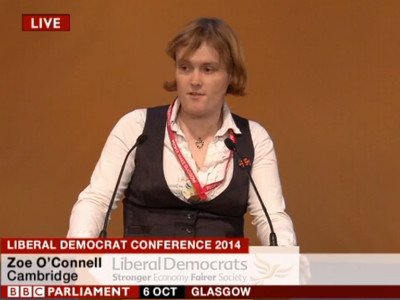For the last year I’ve had the good fortune to be able to serve as a member of the Liberal Democrat Equality Policy Working Group, and yesterday conference accepted the motion that came out of that, making it official party policy.
 There is lots of good stuff in there, but I did want to highlight the LGBT and marriage sections in particular. We heard much evidence from other groups too, and some of the awful statistics relating to education and stop-and-search for young Afro-Caribbean men in particular stick in my mind – but others deserve the credit for campaigning on those areas, so I’ll let them talk about them.
There is lots of good stuff in there, but I did want to highlight the LGBT and marriage sections in particular. We heard much evidence from other groups too, and some of the awful statistics relating to education and stop-and-search for young Afro-Caribbean men in particular stick in my mind – but others deserve the credit for campaigning on those areas, so I’ll let them talk about them.
Remember, these are now official party policy. They are not just policy of the LGBT group or aspirational aims of a subgroup. Actual official party policy. (Some of these items were already party policy, but were restated in the policy document for clarity)
LGB and LGBT issues
- Review the Blood Ban. We’re currently in the ridiculous situation where a man who has sex with other men, even safe sex, is banned from giving blood for 12 months. However, it doesn’t matter how many unsafe sexual relationships anyone else has as they can still give blood. Even more confusingly, if you are a woman married to (And having sex with) a bisexual man who has ever had sex with another man, you can not give blood ever. Even if your husband can.
- An evidence-based approach to tackling *phobic bullying in schools. There is an evidence-gathering programme, started by LibDem Equalities Minister Jo Swinson MP, that will report back on how we can bet do this.
- “…mainstream discourses should consider more authentic ‘inclusive sexualities’ in advertising, media, and sport to help break down prejudice.“ and more specifically later on “positive images of transgender individuals in central government publications. Hopefully self-explanatory!
Trans issues
- ‘X’ (Unspecified) gender markers on passports. A big benefit for the non-binary community if we can make it a reality, but this is good for all trans and intersex people and society in general. There is no particular reason the state needs to concern itself with gender in the vasy majority of situations, especially when it comes to official ID. For example, did you know about the very patriarchal approach of the DVLA, which includes titles on women’s driving licenses but not men’s?
- Ending the Spousal Veto. If you don’t know what the Spousal Veto is, Sarah Brown has an excellent primer here. In short, the veto was introduced by the Same-Sex Marriage Act and allows a partner to block legal gender recognition of a spouse who has transitioned and prevent them obtaining potection from employment discrimination, even after the two year wait required for the legal process.
- Restoring stolen trans marriages. Under the pre-same-sex-marriage regime, even if a couple stayed together they were required to have their marriage annulled if one partner wanted to fully transition.
- Removing the requirement for a diagnosis of gender dysphoria in order to obtain legal gender recognition. This would further reduce unwelcome medical gatekeeping when it comes to people’s identities, and also fix the mess that intersex people find themselves in. Currently, if you have an intersex condition and potentially had your legal gender assigned arbitrarily by a doctor at birth, you are unable to obtain a diagnosis of gender dysphoria (It’s a different diagnosis) and thus can not obtain a Gender Recognition Certificate.
Non-LGBT marriage issues
- Allow the Church of England to decide itself if it wants to carry out same-sex marriage. At the moment, the Church of England is prohibited by law from carrying out same-sex marriage, but with the way things are going I can well see that changing in the not too distant future.
- Allow Non-religious (Humanist) marriage ceremonies. Already permitted in Scotland, we would like to see this introduced in the rest of the UK.
- Include both parent’s names on marriage certificates. Current certificates only list the father, which is a very outdated patriarchal approach.
You can download the full policy paper, in .docx format, here.

